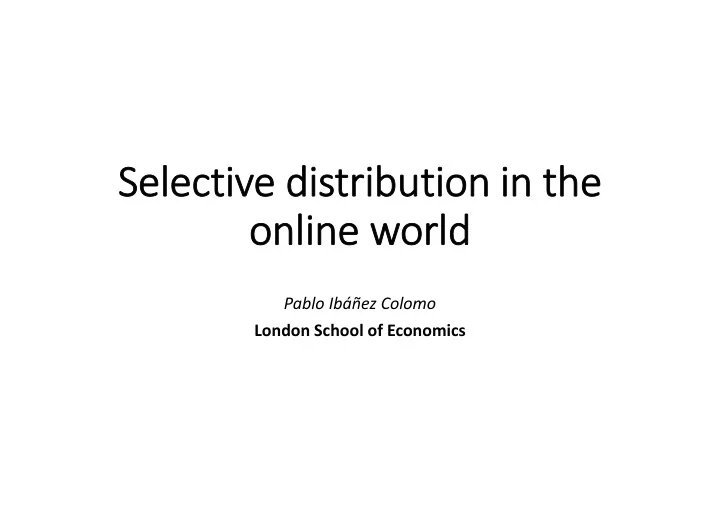

Sele Selectiv ctive dis istrib tributio ution in in the the onlin line wo world Pablo Ibáñez Colomo London School of Economics
Selectiv Selective dis istrib tributio ion in in the the online online wo world
Selectiv Selective di distribut bution in in the the online online wo world • Consider the questions raised before the Court in Case C ‐ 230/16, Coty v Akzente • ‘Do selective distribution systems that have as their aim the distribution of luxury goods and primarily serve to ensure a ‘luxury image’ for the goods constitute an aspect of competition that is compatible with Article 101(1) TFEU?’ • ‘Does it constitute an aspect of competition that is compatible with Article 101(1) TFEU if the members of a selective distribution system […] are prohibited generally from engaging third ‐ party undertakings discernible to the public to handle internet sales[…]?’ • Does the relevant case law not suggest that the answer to these questions is yes?
Selectiv Selective di distribut bution in in the the online online wo world • Since Metro I , the Court has understood that the essence of selective distribution is the prohibition of sales to non ‐ members • Is a ban on third party platforms fundamentally different from this key feature? • It has never been a secret that selective distribution leads to price rigidity ( Metro I and Metro II ), but this is not enough to establish a restriction • Businesses resort to selective distribution to preserve their brand image • Can the law ignore this reality? It is known to be pro ‐ competitive, and as such not the sort of clause that is deemed restrictive by object • In Pronuptia , the Court held that measures aimed at preserving the uniformity and reputation of a business are not restrictive
Re Regulation, competitio ition and nd onlin line pl platform rms Pablo Ibáñez Colomo London School of Economics
‘Com ‘Competitio tition is is fo for lo lose sers’
‘Com ‘Competitio tition is is fo for lo lose sers’ • The activities of the so ‐ called Internet overlap to some extent; on the other hand, they have carved a unique niche • Suffice it to think of the overlaps between WhatsApp and Skype, or between Google (Shopping) and Amazon • Thus, in a sense, one could argue that competition is intense in online markets; in another, that it is severely weakened • What are the implications for competition law and policy? • Can ‘copycat competition’ (e.g. Google Shopping) be meaningfully protected? Should it be protected? • Establishing causality is a challenge of particular importance: would some firms have left the market anyway?
Pl Platform rms and and busin business ss model models
Pl Platform rms and and busin business ss model models • Online platforms pursue a variety of strategies and business models • They vary in the range of activities they control and to which they give access to third parties • These choices have implications for their business model • There is not a unique way in which they make money • Some contentious restraints are the intrinsically linked to a particular business model • What is the role of competition law, against this background? • Is there a reason to believe that a more open platforms is, always and everywhere better for competition? • Is the legal system equipped to deal with the complex trade ‐ offs involved?
Recommend
More recommend